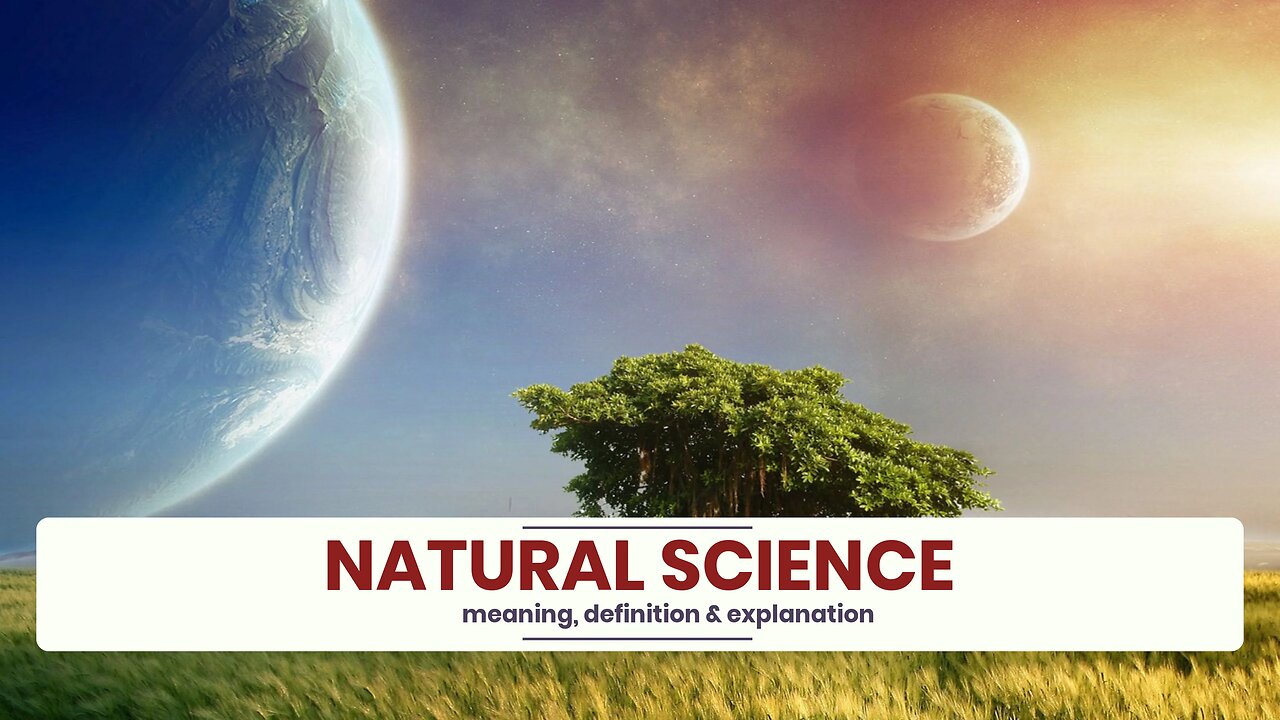Premium Only Content

What is NATURAL SCIENCE?
✪✪✪✪✪
http://www.theaudiopedia.com
✪✪✪✪✪
What does NATURAL SCIENCE mean? NATURAL SCIENCE meaning - NATURAL SCIENCE definition - NATURAL SCIENCE explanation. What is the meaning of NATURAL SCIENCE? What is the definition of NATURAL SCIENCE? What does NATURAL SCIENCE stand for? What is NATURAL SCIENCE meaning? What is NATURAL SCIENCE definition?
Natural science is a branch of science concerned with the description, prediction, and understanding of natural phenomena, based on observational and empirical evidence. Mechanisms such as peer review and repeatability of findings are used to try to ensure the validity of scientific advances.
Natural science can be divided into two main branches: life science (or biological science) and physical science. Physical science is subdivided into branches, including physics, astronomy, chemistry, and Earth science. These branches of natural science may be further divided into more specialized branches (also known as fields).
In Western society's analytic tradition, the empirical sciences and especially natural sciences use tools from formal sciences, such as mathematics and logic, converting information about nature into measurements which can be explained as clear statements of the "laws of nature". The social sciences also use such methods, but rely more on qualitative research, so that they are sometimes called "soft science", whereas natural sciences, insofar as they emphasize quantifiable data produced, tested, and confirmed through the scientific method, are sometimes called "hard science".
Modern natural science succeeded more classical approaches to natural philosophy, usually traced to ancient Greece. Galileo, Descartes, Francis Bacon, and Newton debated the benefits of using approaches which were more mathematical and more experimental in a methodical way. Still, philosophical perspectives, conjectures, and presuppositions, often overlooked, remain requisite in natural science. Systematic data collection, including discovery science, succeeded natural history, which emerged in the 16th century by describing and classifying plants, animals, minerals, and so on. Today, "natural history" suggests observational descriptions aimed at popular audiences.
-
 1:52
1:52
The Audiopedia
6 months agoWhat is EXECUTIVE DIRECTOR?
501 -
 LIVE
LIVE
The Quartering
3 hours agoTrump To INVADE Mexico, Take Back Panama Canal Too! NYC Human Torch & Matt Gaetz Report Drops!
4,090 watching -
 DVR
DVR
Nerdrotic
3 hours agoA Very Merry Christmas | FNT Square Up - Nerdrotic Nooner 453
14.7K3 -
 1:14:05
1:14:05
Tucker Carlson
3 hours ago“I’ll Win With or Without You,” Teamsters Union President Reveals Kamala Harris’s Famous Last Words
71K188 -
 1:58:31
1:58:31
The Dilley Show
3 hours agoTrump Conquering Western Hemisphere? w/Author Brenden Dilley 12/23/2024
59.7K7 -
 1:09:59
1:09:59
Geeks + Gamers
4 hours agoSonic 3 DESTROYS Mufasa And Disney, Naughty Dog Actress SLAMS Gamers Over Intergalactic
32.7K7 -
 51:59
51:59
The Dan Bongino Show
5 hours agoDemocrat Donor Admits The Scary Truth (Ep. 2393) - 12/23/2024
569K1.5K -
 2:32:15
2:32:15
Matt Kohrs
16 hours agoRumble CEO Chris Pavlovski Talks $775M Tether Partnership || The MK Show
90.7K26 -
 28:23
28:23
Dave Portnoy
16 hours agoDavey Day Trader Presented by Kraken - December 23, 2024
112K32 -
 59:29
59:29
BonginoReport
7 hours agoTrump, Murder Plots, and the Christmas Miracle: Evita + Jack Posobiec (Ep.110) - 12/23/2024
126K99